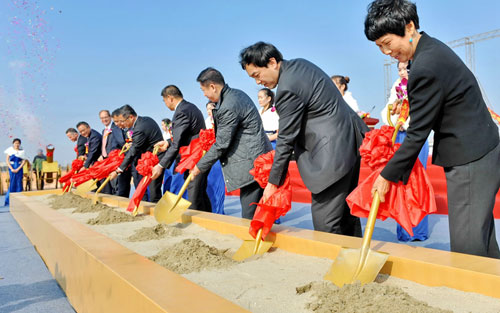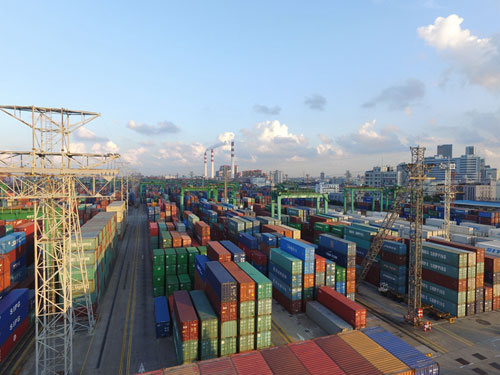(Zhang Zhongkai, Xinhua) In 1992, Switzerland-headquartered global technology company in power and automation ABB Group established its first branch in China. However, it was required then to be joint venture as the country just started to open up its market.
Now, ABB has 40 companies in China, many of which are fully owned by itself and China has become ABB’s second largest market.

ABB, a global leader in power and automation technologies, started the construction of an industrial center in Xiamen city, southeast China's Fujian Province, on Thursday.(Xinhua/Lin Chuanshan)
“We have seen fewer investment barriers during the past 30 years, especially in the manufacturing sector. The Chinese market is opening wider to foreign companies,” said Dong Huijuan, vice president with the China branch of ABB Group.
While global economic slowdown has put pressure on foreign companies in China, new opportunities have emerged as the Chinese market continues to open.
Since it opened up over 30 years ago, China has been the top investment destination among developing countries for 24 consecutive years, with over 850,000 foreign firms investing in China with the total investment reaching $1.7 trillion U.S. dollars.
Facing economic headwinds, China is opening its markets more quickly to attract more foreign investment and will continue to open up, the Chinese leadership vowed during the recent G20 Summit.
China's top legislature revised four laws regulating inbound investment earlier this month, with an easing of rules for foreign and Taiwanese investors looking to start businesses across China. The Ministry of Commerce also released a new set of supporting measures to promote a "negative-list" approach in approving foreign investment.
China was no longer the top destination for foreign investors as foreign investment in China slowed last year, according to a report released by the United Nations Conference on Trade and Development .
Companies cannot do business in China the same as 20 years ago because the market has evolved, according to Harley Seyedin, president of the American Chamber of Commerce in South China, adding that China continues to offer new opportunities to foreign investors and will remain a great destination for US investors for many years to come.
The time for simple manufacturing and exports is gone, and now opportunities to tap Chinese consumption, health care, education and other sectors have arrived, Seyedin said, adding it is important to be Internet-savvy and consumer-minded.
A survey of 246 US companies operating in south China released earlier this year showed that 75.6 percent of all participants report providing goods or services to the Chinese market as their primary business focus rather than creating goods or services for export.

Aerial photo shows a view of the China (Shanghai) Pilot Free Trade Zone in Shanghai, east China, on Sept. 19, 2015. (Xinhua/Ding Ting)
Official data showed that foreign investment actually utilized in the services sector grew 10 percent year on year in the first eight months of this year, accounting for about 70 percent of the total, while that for high-tech services surged 98.2 percent year on year.
“While I were introducing our camera technologies and products, most of the audience took pictures with smart phones, so it’s important to keep abreast with the demands and habits of consumers,” said Lu Jie, director with the Corporation Communications and External Affairs Group with Canon, which developed a smart picture editing and sharing device to cater to increasingly Internet-savvy consumers.
ABB also spot emerging investment opportunities as Chinese economy transitions to greener and more efficient growth. It located its global robotics research center in Shenzhen to better serve the country’s drive for manufacturing modernization and China is now ABB’s largest production base for industrial robots and sales market.
“China is in a new phase of development and our products and services have been in synergy with industrial evolution in China and across the world. This is a win-win story,” Dong said.
